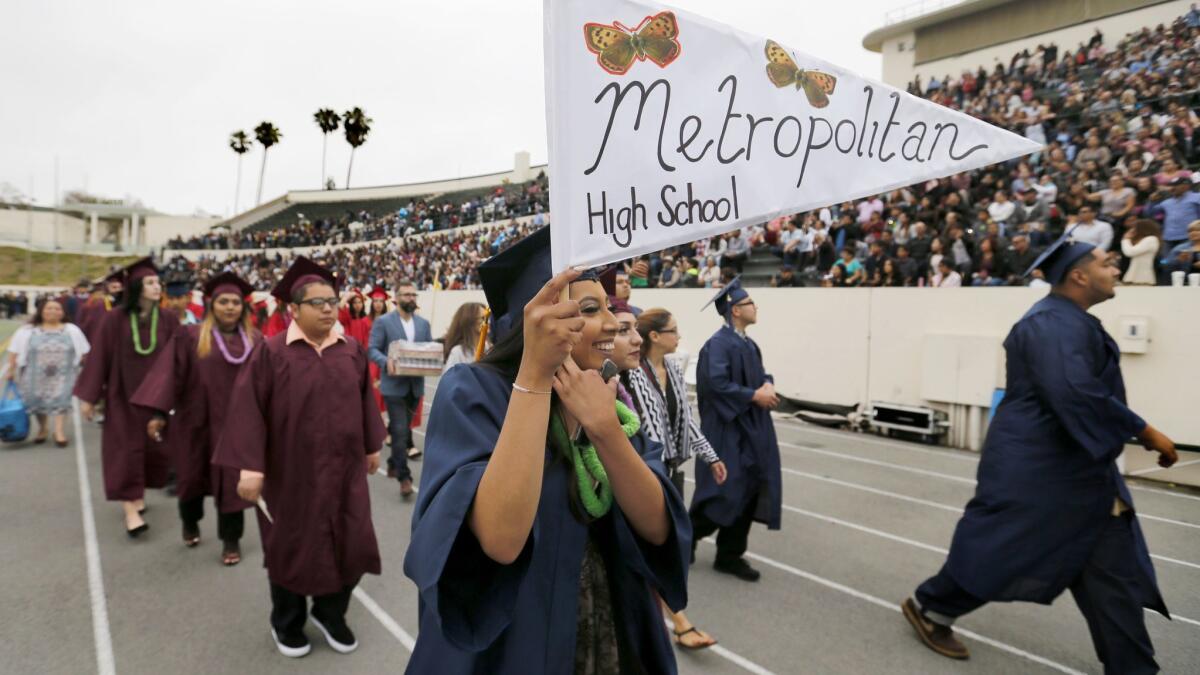L.A. school district says more are graduating, but rate may not show it

The Los Angeles Unified School District has hopes of continuing its winning streak this year with another record graduation rate, but the official numbers may not show it.
A senior district administrator warned the board Tuesday that graduation rates were likely to decline 2% to 3% across the state, including at L.A. Unified, even though the nation’s second-largest school system is likely doing better than ever in producing graduates, he said.
The issue is that the state will now count high school students who transfer to adult school as dropouts, said Oscar Lafarga, who heads the district’s office of data and accountability. Previously, schools treated these students as though they had simply enrolled in another high school, he said.
State officials — and some experts — have been concerned that schools could use such transfers to keep actual and likely dropouts out of the graduation-rate calculation.
District officials contend, however, that their adult education program may be a better way for some students to succeed.
School board President Monica Garcia suggested the district might want to ask for an exemption from the state’s new way of calculating graduation rates. She said the district needed to notify the public that, because of the change, it wouldn’t be fair to compare a rate calculated under the new formula with an older rate.
“We need to be clear that it’s apples and oranges,” Garcia said.
Graduation rates are a controversial topic.
Here and around the country, critics have questioned the rigor of the programs that produce rising rates. Leaders of school districts who have lauded their rising rates often have shown little interest in auditing to find out the extent to which the progress represents real academic gains.
Last year, L.A. Unified announced a record graduation rate of 80% based on preliminary numbers for the class of 2017. The official state figure, which is still unavailable, probably will be lower because of the adult-school calculation change. Even students who go on to adult school and earn a diploma won’t be counted as graduates in the new rate.
The district’s annual graduation rate has risen steadily since 2010, when the figure was 62%.
For many jobs, a high school diploma is an essential credential. But much better jobs are available to college graduates, and the district’s progress in helping students get to and through college lags well behind the graduation rate.
Only about 41% of entering ninth-graders are eligible to apply to a four-year state college in California by the time their class graduates. (This data is for the class of 2016. The district declined to release preliminary figures for later years.)
How adult-school students are counted is just one issue of contention with recent record graduation rates. Another is the extent to which new credit-recovery methods allow students to make up needed classes more quickly than before.
In some districts elsewhere that have used such methods to push hard on graduation, decreased academic rigor and even cheating have been reported.
No one has offered evidence that the L.A. Unified gains are fraudulent, but the progress also has not been studied to determine whether some of the increased rate has come at the expense of consistently rigorous coursework.
In a recent interview, new L.A. schools Supt. Austin Beutner acknowledged the need for both celebration and vigilance.
“More kids graduate high school in L.A. Unified than have in a long, long, long time, if not ever,” Beutner said. “That’s a good thing.
“We also have to be mindful and transparent and say the challenge still remains: How many of those who graduate are not proficient in math? Are not proficient in English? If math is the language of the future in a digital economy, you have to be proficient in math,” Beutner said. “If you learn to read so you can read to learn, you have to be proficient in reading. So those two thoughts should be able to coexist.”
UPDATES:
June 20, 3 p.m.: This article was updated to clarify details of the board’s discussion about the state’s new way of calculating graduation rates.
9:45 p.m.: This article was updated to clarify that the most recent released data on the percentage of L.A. students who qualify for a four-year state college is based on the class of 2016, not the class of 2018.
This article was originally published at June 19 at 6:05 p.m.
More to Read
Sign up for Essential California
The most important California stories and recommendations in your inbox every morning.
You may occasionally receive promotional content from the Los Angeles Times.











